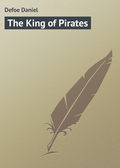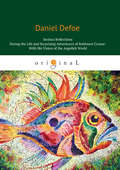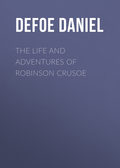
Даниэль Дефо
A Short Narrative of the Life and Actions of His Grace John, D. of Marlborogh
Upon my arrival here, I had notice that my name was brought before the commissioners of accounts, possibly without any design to do me a prejudice. However, to prevent any ill impression it might make, I have writ a letter to those gentlemen … and when you have taken the pains to read the inclosed copy, pray be so kind as to employ your good offices, so as that it may be known I have the advantage of your friendship. No one knows better than your lordship the great use and expence of intelligence, and no one can better explain it; and 'tis for that reason I take the liberty to add a farther request, that you would be so kind to lay the whole, on some fitting opportunity, before the queen, being very well persuaded her majesty, who has so far approved, and so well rewarded my services would not be willing they should now be reflected on.12
Defoe points out that criticism of the Duke "may prove Dangerous and Fatal" and the joy in the French court at each step in Marlborough's fall reinforces Defoe's and Harley's opinion13 Defoe recounts Marlborough's greatest military victories beginning as far back as his campaign in Brabant (reminding his readers of possible wealth gained through a shipwreck and of the betrayal of Dunkirk as he goes along), includes descriptions of his exemplary behavior including regular prayers for the Camp, and praises Marlborough as a "finish'd Hero." The conclusion to the pamphlet warns the nation again of Marlborough's importance; his battles are bringing the enemy to "reason," procuring "an honorable and lasting peace." References to the detrimental effect of discrediting the general are found intermittently throughout the pamphlet in allusion to Hannibal.
Defoe, then, served Harley's purposes well. He defended Marlborough and shored up his prestige in a time when it was important for the French to think that Marlborough could prosecute the war freely. As a known employee of Harley's, Defoe furthered Marlborough's impression that Harley could be depended upon.14 Finally, he began to prepare the moderate Whigs for peace by presenting the economic considerations and disassociating Marlborough from the Queen's and the ministry's "business of peace."
The possibility that Defoe acted independently in this writing cannot be discounted.15 Defoe had praised Marlborough since the beginning of his career and the extent to which he and Godolphin adopted William's policies added to Defoe's admiration; admiration is clear in this pamphlet. Defoe had worked for Godolphin and Sunderland, and may have used "by an Old Officer in the Army" as a disguise from Harley or even as a means of publishing independently. That Defoe resented attacks on his hero can hardly be doubted – the Review and his pamphlets are a catalog of the general's triumphs, and no where does he attack unequivocably; even in No Queen he puts chief blame on rumors and on Marlborough's party. Harley's failure to make permanent provisions for Defoe may suggest some dissatisfaction, but even if the possibility that the Life was not expressly ordered by Harley is considered, it is noteworthy that nothing in it is offensive to Harley, and, more important, remarkable that it serves Harley's needs and ends at the time so well.
Definitely Defoe's, however, are veiled but telling attacks on Swift and his type. Although the purpose of the Examiner was to "furnish Mankind, with a Weekly Antidote to that Weekly Poison,"16 Defoe parodied this by saying his pamphlet was to "undeceive the People." The "base Pamphleteers" are labeled uninformed and ungrateful; they have no way of making right judgments in the matter of perquisites and soldier's pay; they go out to see a battlefield as they might a well laid-out garden, and, of course, their "Mouths go off smartly with a Whiff of Tobacco" (an obvious ridiculing contrast to the cannon fire of the real fighters).
Furthermore, compared to attacks on Marlborough in libels such as The Duke of M***'s Confessions to a Jacobite Priest, The Land-Leviathan: or, the Modern Hydra, and The Perquisite Monger, Defoe's pamphlet was exemplary in its moderation. Even Swift's attacks are moderate beside the majority of these 1711-12 pamphlets; not even he conjured up memories of regicide and rebellion as did the more numerous and libellous pamphleteers. For example, The Mobb's Address to my Lord M*** (1710) linked Marlborough to Sacheverell and assured the Duke his "most dutiful Mobb, will use our utmost Care and Diligence to raise all riotous and tumultous Assemblys, and with undaunted Vigour … oppose … all who will keep up the Authority of the Crown." Oliver's Pocket Looking Glass (1711) while more erudite was scarcely less inflammatory – shades of Cromwell were called up, a "Colossus" with an "Army compos'd of almost all nations" faced the "body politic."
The Life exemplifies many of Defoe's life long interests and opinions and points to the fiction he was to write. Virtues espoused throughout his career are praised here. Ingratitude was a deplorable but all too common failing of mankind – that Marlborough should be "undervalued and slighted" was "no new Thing, all the Histories of the World are full of Examples to this purpose" and his greatness provides but a mark at which the envious may shoot. In Atalantis Major Defoe elaborates on the causes of the nation's ingratitude: the debt was too great for payment and resentment was the natural result. A second interest was the military hero; much of Defoe's fiction —Memoirs of a Cavalier, Captain Singleton, for instance – involved military men, and Marlborough along with King Gustavus Adolphus of Sweden, another soldier who scorned the conventional seventeenth century chess game tactics, furnished a model. The "finish'd Hero" described includes all of the virtues of Defoe's fictional leaders from Robinson Crusoe to John in Journal of the Plague Year to the Cavalier – "Prudent, and Vigilant, and Temperate, Alert, and industrious, with an humble Submission to the Will of the Almighty" (26), "Temperate, Sober, Careful, Couragious, Politick, Skilful, so he is Courteous, Mild, Affable, Humble, and Condescending to People of the meanest Condition" (45). The Duke's virtues as well as Gustavus's enable the reader of Memoirs of a Cavalier and The Memoirs of Captain George Carlton to judge the commanders as Defoe would have. Above all, the "assured Skill" and "daring Courage" appealed to Defoe – Robinson Crusoe's campaigns against the cannibals and in the Far East repeat the daring, risk-all quality of Ramilles. Defoe's enjoyment of marching vicariously over great battles has led biographers such as J. R. Moore to say that it was unfortunate his military genius was never used,17 and is obvious in almost all of his fiction. So skillful are his descriptions that J. H. Burton pauses to note "the character and claims of a book (Memoirs of Capt. George Carlton, 1728) that has afforded him valuable instruction on the general character of the war, along with special instructions in its leading events."18
Defoe's Life was his first biography; other "memoirs" of the Duke of Melfort (1714), Daniel Williams (1718), and Major Ramkins (1719) suggest the progression to The Life and Strange Surprizing Adventures of Robinson Crusoe (1719) and two other lives in that same year. Defoe's sometimes troublesome skill with narrative voices is, in the Life, a shadow of the competence displayed in Moll Flanders. Although the "old Officer's" voice is sustained and there are excellent touches, the distinctiveness and absorbing intimacy are only hinted at. The polemist appeals too apparently to his readers while the opening pages approach a declamation. The persona protests that he doesn't "pretend in this Narrative to Inform the great People at Court, concerning this thing," and that he writes only for the common people. Defoe does limit carefully his material to events which were common knowledge or would have been open to an old soldier – while he describes the key maneuver of Ramilles, he certainly lacks a complete overview. Many of the virtues praised would appeal most strongly to men who might have been common foot concerned with regular bread, a well-run camp, and a conscientious strategist, or to simple, pious women glad to hear that their general prayed and provided Sunday sermons. Allusions to Satan, "the cunning engineer," Solomon, and Moses were common enough, while those to Hannibal and Raleigh had been exploited in Defoe's other writing. Perhaps the most graphic section in this voice is the description of the common soldier's misery in a rainy season march and siege. A few passages have the confidential, gossipy tone of ordinary people around a tavern table – Sarah was admired abroad, but in her own country it was said she was "guilty of more Folly than a Retainer to the College in Moore-Fields,"19 an experienced old general knows more coffeehouse quarterbacks, and the soldier naively speculates with relish how "my Lord" narrowly escaped being "torn in Pieces" for the rumor that he spoke words which would be "brutal from the mouth of a Porter." Naive arguments (no man would continue in so hard an undertaking from selfish motives), sincere patriotism (defense of his King and Queen and praise for a nation "with a generous Race of Warlike People" ready to risk their lives), and honest indignation at "barbarous Lies" authenticate the narrator.
Defoe's writing – fiction and non-fiction – is all of a piece. The same subjects and opinions reoccur and the techniques and style are nearly indistinguishable. Expository material alternates with narrative examples (which may in turn be followed by a paragraph or two drawing a conclusion or a "moral") in all of his writing. The primary difference is in the length of the narrative examples – in the fiction they are naturally much longer. Over the years, they become increasingly dramatic as may be seen in books such as The Fortunate Mistress and Conjugal Lewdness. A Short Narrative conforms to this structural pattern. Sentences which direct the reader's attention to this structure are common. For instance, Defoe defends Marlborough's courage with descriptions of the battle of Brabant, Ramilles, references to Hannibal, and concludes, "And thus then you see, that our General wants neither Conduct or Courage." Defoe's skill with these short, dramatic, illustrative examples developed with the years. Defoe was always concerned with presenting a case clearly and persuasively. Clearly marked structure and "reasonable" conclusions alternate with anecdotes and reminiscences intended to hold the reader's interest and dramatize Defoe's points.20
Defoe's Life of Marlborough serves as a kind of barometer for the age and for Defoe. A reliable if sketchy list of the Duke's military successes and the major charges raised against him at various times during his life may be matched to the struggles in the English government and on the continent. The time had nearly come for the Jacobites, whom Marlborough had offended by deserting James, and the Tories, who had long thought him a presumptuous general and a former Tory (or a lukewarm Tory as Marlborough might have thought himself) who had perverted a Tory Queen, brought the Bill of Occasional Conformity to defeat, and driven Tories out of office, to collect the debt that they felt Marlborough owed them. The biography, written in the interim between two foreign policies when so many momentous plans were proceeding backstage, mirrors the age. It is also a barometer by which Defoe's development can be measured; his journalistic involvement and employment, his non-fiction techniques as well as his progress toward the fiction are implied.
Rollins College
Winter Park, Florida
BIBLIOGRAPHICAL NOTE
The facsimile of Defoe's A Short Narrative of … Marlborough (1711) is reproduced from a copy (Shelf Mark: *PR3404/S5451) in the William Andrews Clark Memorial Library. The total type-page (p. 7) measures 153 x 79 mm.







